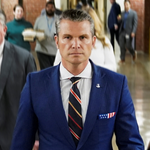
“AAHHHH!” was journalist Kara Swisher’s single-word review after finishing Nouriel Roubini’s new book, MegaThreats: Ten Dangerous Trends That Imperil Our Future, and How to Survive Them. Roubini is the Turkish-born American economist who famously predicted the 2008 financial crisis and was later dubbed “Dr. Doom” in a New York Times piece highlighting his foresight. But he’s not fond of that nickname, he says in the latest episode of On With Kara Swisher, preferring instead the less catchy “Dr. Realist” since he does not see himself as the “permabear” doomsayer others make him out to be.
Swisher and Roubini discuss his track record of pessimism and she tries to extract some good news from him, but that’s not very easy during a time of volatile global markets, pandemic upheaval, rampant inflation, and the disruptive hot war in Ukraine. They also talk about why Roubini believes “The Flintstones had a much more sophisticated monetary system than crypto,” the recklessness of Elon Musk’s geopolitical musings, and why rising sea levels may force the U.S. and Canada to merge into a single country. And in the below excerpt, Swisher asks Roubini about the unique threats posed by China — which he writes about extensively in his book — and for his review of the Biden administration’s tough trade-war tactics with Beijing thus far.

On With Kara Swisher
Subscribe on:
Kara Swisher: In one chapter, you say, “We are in a new cold war between the U.S. and China,” which you discussed just earlier, which is leading to deglobalization. In another, you write that whoever controls AI may become the dominant world power. What’s the bigger risk for the U.S.? Economic pain caused by decoupling from China, or maintaining close economic ties with China and allowing them to win the AI race, which many think they already have.
Nouriel Roubini: Well, the issue is whether you can compete with China and prevent them from dominating the industries of the future, and all the industries of the future are gonna be related directly, indirectly to AI, machine learning, IOT, that allows you to collect the big data, and then 5G or 6G — that’s gonna allow you to then use this data to create goods and services and so on. Uh, can you at the same time engage China, cooperate on some things, compete on other things, and confront China on other ones? That will be the ideal world, but my view is that we’re moving towards a situation where cooperation is nowhere to be seen on anything. They don’t want to cooperate on climate change.
They didn’t corporate on pandemics. They don’t want to corporate on financial things. They want to create their own alternative international monetary-trading financial currency system. That’s what they’re doing. They’ve given up on the west. So there is no cooperation. We’re competing on everything, but they are not now also confronting each other from a Chinese point of view. We’re trying to contain them. And from the U.S. point of view, China has used lots of tools to have unfair trade and stealing our intellectual property rights and now is becoming a geopolitical threat, not just an economic threat.
Kara Swisher: Right.
Nouriel Roubini: So this is the two cities trap, and the question is only whether this cold war is becoming colder, is gonna lead to a hot war or not, and when that’s gonna happen. That’s the question.
Kara Swisher: I’ve been writing about the threat from China for years, for years and years and years, way back when because, um, it’s very apparent that they were moving ahead not just as a copycat or a stealer of IP, but an actual creator of innovation and, and everything else. So the Biden administration, like the Trump administration, essentially has gone to war with China’s tech industry. Something I watched very closely. They recently announced new export limits on semiconductors and related technology.
Nouriel Roubini: Yeah.
Kara Swisher: That’s led companies to pull their engineers from projects. Um, everyone’s rejiggering, including Apple, which is I think one of the most ensconced companies. They’re moving to India and other places. Um, is it wise for Biden to go after China so forcefully?
Nouriel Roubini: If anything, actually the Biden administration is tougher on China than Trump. So in that sense, the U.S., uh, has a consensus that China is a strategic competitor and we have to address this strategic competition. And how we do it is through lots of stuff, starting with technological restriction.
But one point I think is important — once you restrict, say, 5G, because uh, say if our phones were using the Huawei 5G, that will be a back door to the Chinese government. Uh, tomorrow, is not just our phones, of course, our autonomous vehicle system are based on big data, IOT, 5G, and therefore who controls that stuff can control also whether your cars are moving or not. But every piece of consumer products, even low-end ones, even your toaster, even your microwave, even your coffee machine is gonna have a 5G chip. So if, uh, your phone is a listening device, your toaster is a listening device. So decoupling on this thing implies that ten years from now we should not buying even toasters or coffee machines.
So a world in which you decouple technological is a world in which every good and service in the future has some of that 5G, and therefore you have to decouple a hundred percent on everything with China. I don’t think people have realized what 5G decoupling implies for decoupling on the entire dimension of the trade relation between U.S. and China.
Kara Swisher: This is everything. It absolutely is.
Nouriel Roubini: It’s everything. Literally everything.
Kara Swisher: It’s so funny that all the focus is on TikTok when it’s actually the toaster. No, I mean, beyond that.
Nouriel Roubini: Yeah. Literally, the toaster is as much of a listening device.
Kara Swisher: Yeah, yeah, TikTok is …
Nouriel Roubini: I mean, they started to worry about the webcams right in the homes and in the government. But that’s again, every piece of anything. Your, your coffee mug is gonna have a 5G chip in the future.
Kara Swisher: Can the U.S. actually win here, or is it too late? Do you see a possibility, there’s thoughts about returning manufacturing to the United States? We of course invented the internet. Um, is there a way to get back and how does that happen?
Nouriel Roubini: Well, from a point of view of innovation, I would say that, uh, the U.S. is still ahead of China and the Chinese policy bashing the private sector are gonna lead to a weakening of private-sector confidence. And command and control doesn’t work very well when it comes to true innovation and so on. So you can throw a lot of money, and they’re doing strides on it.
But I would say that we have the right technologies, the right innovation, and so on. What we don’t have is manufacturing, but we have to start to think also about a new industrial policy. I mean, the Chinese know that probably they’re not gonna have access to our semiconductors and maybe possibly those of Taiwan — unless they take over Taiwan.
But the risk is that China’s gonna take over Taiwan or bombs, even those factories, and then we are really naked. That’s why the U.S. has said to Samsung, has said to TSMC: “Why don’t you start building semiconductor factories in the United States?” We haven’t done it for a while. So we have to think about an intelligent industrial policy, not just industrial manufacturing, also technology in general.
Kara Swisher: Yes.
Nouriel Roubini: Yeah, we can still be successful. We can win that war, but we cannot just be laissez-faire about it and think that the market is gonna take care of it. If you go the market, the market folks like Tesla and Elon Mask are caring about their own profits. They’re not caring about national security. They’re even willing to appease China on Taiwan. So we cannot rely on the Teslas and the Elon Musks of the world for having enlightened economic policies for this threat.
This interview has been edited for length and clarity.
On With Kara Swisher is produced by Nayeema Raza, Blakeney Schick, Cristian Castro Rossel, and Rafaela Siewert, with mixing by Fernando Arruda, engineering by Christopher Shurtleff, and theme music by Trackademics. New episodes will drop every Monday and Thursday. Follow the show on Apple Podcasts, Spotify, or wherever you get your podcasts.
More From 'on with kara swisher'
- Ron Klain Still Thinks Biden Got a Raw Deal
- Gretchen Whitmer on Why She’s Still Confident in Biden
- AOC on Gaza, Insults, AI, and Whether Trump Will Lock Her Up





























